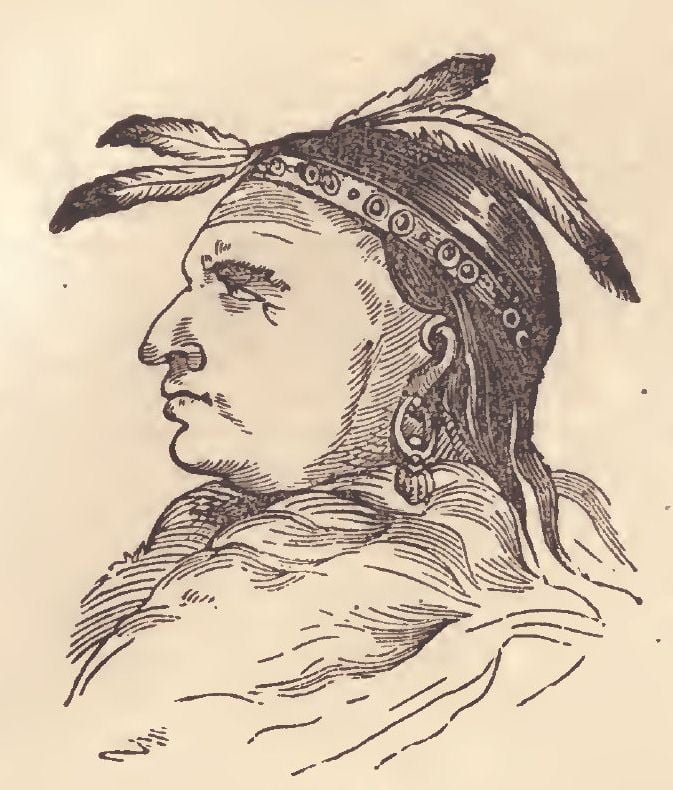
About the first of April Black Hawk’s band assembled at Fort Madison for the purpose of making arrangements to ascend the Mississippi, and soon after the entire party started. The old men, women and children, with their provisions and camp equipage, in canoes, and the men all armed, came on horseback. On the sixth day of April, the braves, on horseback, made a call at Yellow Banks, one day after the canoes had passed the same point, and told Josiah Smart, Mr. Phelps’ interpreter, where they were going, and the object of their visit. They said they had observed a great war chief, with a number of troops going up on a steamboat, and thought it likely that the mission of this war chief was to prevent them going up Rock river, but they were bound to go. Messrs. Phelps and Smart tried to persuade them to re-cross the river and return to their country, assuring them that the Government would not permit them to come into Illinois in violation of the treaty they had made last year, in which they had agreed to remain on the west side of the river. But they would not listen to their advice. On the next day they took up the line of march for Rock river, and on the 10th of April, 1832, Black Hawk, with a portion of his band of Sacs, reached the mouth of Rock river a few miles below Rock Island. The old men, women and children with their provisions and camp equipage, who came up in canoes, arrived on the 9th, and the men all armed, came up on horseback, reaching the camp on the 10th. While encamped there they were joined by the Prophet, who had previously invited them to come up to the country of the Winnebago and raise a crop. He called on his way at Fort Armstrong and had talks with the Agent and Col. Davenport, the trader, both of whom advised him to persuade Black Hawk and party to return to their own country, or they would be driven back by the soldiers then at Fort Armstrong, under the command of Gen. Atkinson, who had just arrived. The Prophet would not listen to their advice, but assured Black Hawk that he had a right to go forward with his entire party to the Winnebago country; and as he expected large reinforcements to his little army as he ascended Rock river, he was determined to go forward, but had given positive orders to his band, under no circumstances, to strike a blow until they had been reinforced by warriors from the Winnebago and Pottawattomie.
Early next morning they broke camp and started up Rock river, but were soon overtaken by a small detachment of soldiers, who held a council with Black Hawk and communicated to him the orders of Gen. Atkinson. These were for him to return with his band and re-cross the Mississippi. Black Hawk said, as he was not on the war path, but going on a friendly visit to the Prophet’s village, he intended to go forward, and continued on his journey. On receipt of his answer, Gen. Atkinson sent another detachment to Black Hawk with imperative orders for him to return, or he would pursue him with his entire army and drive him back. In reply, Black Hawk said the General had no right to make the order so long as his band was peaceable, and that he intended to go on to the Prophet’s village.
In the meantime the forces under the command of Gen. Whitesides had arrived, and were turned over to Gen. Atkinson by the Governor. The brigade, under the command of Gen. Whitesides, was ordered up Rock river to Dixon’s Ferry, and as soon as boats could be got ready, Gen. Atkinson started for the same destination with 300 regulars and about the same number of Illinois militia. Black Hawk with his party had already reached a point some thirty or forty miles above Dixon’s Ferry, where they were met in council by some Pottawattomie and Winnebago chiefs. They assured Black Hawk that their people would not join him in making war against the United States, and denied the Prophet’s story to him. During this council Black Hawk became convinced that he had been badly imposed upon by the Prophet, and resolved at once to send a flag of truce to Gen. Atkinson and ask permission to descend Rock river, re-cross the Mississippi and go back to their country.
